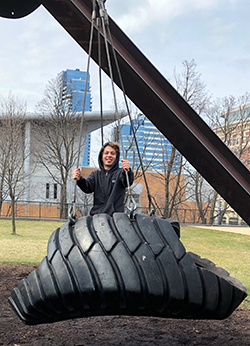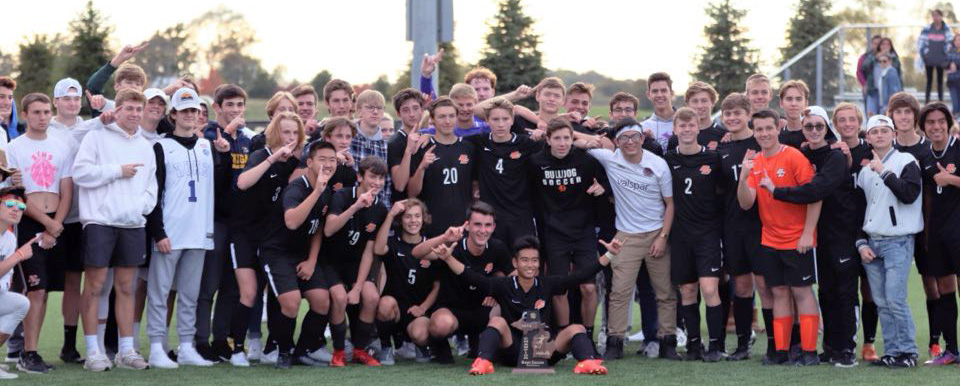“I want to stay,” I overheard our exchange student from Brazil, Rafael Martins, say to my husband, Mike, and my heart started to break.
For the past five years we have hosted four exchange students, from Spain, Denmark and Italy, who attended Byron Center High School, as well as a student and chaperone/teacher from Spain who was here for a summer program. We host to share with the students about our American culture and to learn more about theirs. I had never heard of the Canary Islands in Spain until our first exchange student, Denise Morera Trettin. Now it is on my itinerary of places to see along with Ventura, Spain; Aalborg, Denmark; and Lake Como, Italy.
Brazil was not on that list until after we hosted Rafael, who also attended Byron Center High School and spent the first part of the school year with another family. During his brief two-week stay with us, he became a part of the family, cooking, playing games and going for walks. Saying good-bye is never easy, and while Rafael’s stay was short, his good-bye — for all of us — seemed especially hard, as his dream of experiencing an American high school had been cut short due to the COVID-19 pandemic. Like many exchange students, he was heading home.

We all understand the difficult decision behind this. There is the worry of a student needing treatment while in the U.S. as hospitals prepare for an overflow of COVID-19 patients. There is also concern about what to do if something happened to a family member at home with the potential of borders being closed and the student having no way to return to their native country. Besides, during a challenging time like this, almost everyone might agree, the best place to be is home with family.
Tough Decisions
Nguyen Son, an exchange student from Vietnam who lived with a different family and also attended Byron Center High School, said that like so many others he first heard about COVID-19 in February as the crisis began to unfold in China. About a month later, he was making the decision to head home.
“We decided I should go home, my host family, my family and me,” said Nguyen, who is now in a 14-day quarantine at the University of Vietnam before he can return home to his family. “There was concern that the government may close the border and I would become stuck in the U.S., and both my family and my host family did not want that.
“I felt really sad, but it was definitely necessary for me to go back to my country.”
Rafael, who like Nguyen came to the U.S. at the start of the school year in August, was holding out hope that school would resume. But at the end of March and with the probability of schools not reopening, the announcement was made by his exchange program that all of its students would be going home.
“I’m sad, but I’m not sad,” Rafael said to me as we talked about his departure. He left on March 31 and except for a quick rebooking for the first leg of his trip, he had no problems getting home. “I am sad that I am leaving, but I am not sad that I didn’t do enough, because I did a lot of things.”

The American High School Dream
The reason students come from other countries to attend an American high school varies. Some want to step out of their comfort zone, others to expand their knowledge or explore American culture. Most want to improve their English. But the biggest reason, I have found, is the American high school experience.
“This was really a year off for me to think about my future,” Rafael said. “The reason I wanted to go back was not so much about the school (studies), but it was just the atmosphere of being in the high school.”
The social aspect of a high school is a big part of the American high school experience.
“Homecoming was awesome. I went with friends, and I even invited a girl and we stayed until the last song, dancing all the time even though none of us really could dance.”
There were also new friends, one of whom invited Rafael to a Bosnian New Year celebration. “So I got to experience both American culture and Bosnian.”
For Nyugen, there were so many different opportunities that included snowboarding and new subjects such as Bulldog power-weight lifting, psychology and health class. He also enjoyed the many holidays, Halloween, Thanksgiving, Christmas and St. Patrick’s Day.

The Missed Opportunities
The early departure also meant there were some high school experiences that neither boy will ever have.
“I feel I am really missing out,” Nyugen said. “There is graduation and prom, obviously, but I missed my track and field season and watching girls soccer and baseball. There also are some journeys with my host family as well.”
While he was able to slip in a tour of downtown Grand Rapids, eat a real coney hot dog and experience an American Easter celebration before leaving, for Rafael it was not getting the chance to see some other iconic West Michigan spots such as the Frederik Meijer Gardens & Sculpture Park and a sunset over Lake Michigan.
Also, like American high school students, the shortened year has left some school issues for both students. Nyugen said he is working with a school counselor to determine his grades and what school level he will be next year. Rafael said since it has been decided that he did graduate, he can now look toward going to a university. Similar to the U.S., Rafael has to take a test to enter college that is normally offered in late summer and early fall. (The school year in Brazil starts in January.) He said that due to COVID-19 it is uncertain when those exams will be offered.
Wouldn’t Have Missed the Chance
Rafael said that even though the year was shortened, he is still happy that he got the opportunity, and Nyugen echoed those thoughts.
“I feel this is my ‘life-changing’ year,” Nyugen said. “I have learned many things. I have developed both physically, mentally and spiritually.
“I appreciate every single moment here.”









